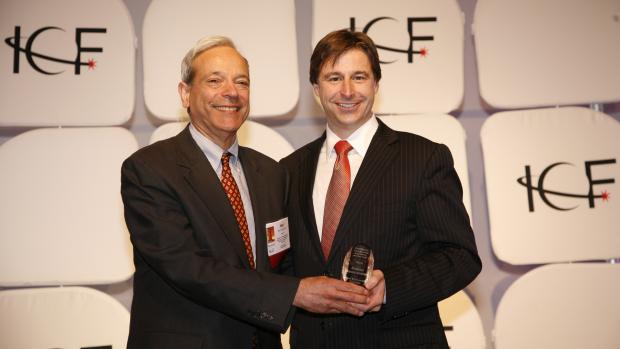Summit Draws World’s Broadband Economy Thought Leaders; Names Suwon, Korea Intelligent Community of the Year

Experts in using information and communication technology to build prosperous, sustainable communities met May 19 - 21 at the Building the Broadband Economy Summit organized by the Intelligent Community Forum (ICF) and held at Polytechnic Institute of NYU. Government leaders from this year’s ICF-nominated Top Seven Intelligent Communities, practitioners, and academics discussed challenges facing cities large and small, from Virginia to South Korea, as they retain talent and grow new businesses in a world transformed by low-cost, high-speed communication and information technology — what the ICF calls “the broadband economy.”
The ICF, a New York-based think tank dedicated to the expansion of the broadband economy, co-hosted the invitation-only summit with NYU-Poly’s Institute for Technology & Enterprise for the sixth consecutive year. “It’s really a laboratory of sorts for us,” ICF co-founder Louis Zacharilla said. “We can host a global dialogue for the world’s communities.”
That description was apt, given the summit’s activities. NYU-Poly President Jerry M. Hultin welcomed the 200 guests on the summit’s first day before they attended workshops and talks led by political and business leaders from around the world — speakers hailed from Sweden, Canada, and South Korea, among other nations. NYU-Poly’s Mel Horwitch, a professor of technology management, moderated a discussion titled, “Can This Community Be Saved?” The question targeted megacities (Manila and Lagos, for example) and asked how such communities can address sociopolitical developments along with economic changes.
Panel member Dr. Jane Snowdon, a senior manager at IBM’s T. J. Watson Research Center, had a provocative response: “Intelligent technologies aren’t enough.” Discussing IBM’s efforts to improve technologies in Africa, where less than 3 percent of the population has access to telephone lines, Dr. Snowdon said educating parents was as important as instructing the young about technology. “We need to change the mindsets of parents so that they allow their children to be trained,” she said.
For locals who do receive training in technology, there’s often “a lot of pride and interest in improving their home countries,” continued Dr. Snowdon. Her observation resonated with Professor Horwitch, who later said, “We want to train our students to do the same thing.” He was referring to NYU-Poly’s diverse community, which features students from as many as 55 countries.
Such broad representation was found among recipients of the Intelligent Community Awards honored at a luncheon capping the summit’s festivities. Suwon, South Korea, received the summit’s top honor: Intelligent Community of the Year (Stockholm, Sweden held the 2009 title; Glasgow and Taipei are among previous years’ winners). Professor Horwitch presented New Brunswick Premier Shawn Graham with the Visionary of the Year Award. Premier Graham highlighted the dramatic and profound impact of New Brunswick becoming 100 percent broadband connected, saying, “There’ll be no haves and have-nots in our province in the Digital Age.”
Founders Awards went to Tianjin Binhai New Area, China; the Pew Research Center's Internet & American Life Project; and the Digital Schoolbag of Besançon, France. Those honorees were cited for their implementation of visionary improvements to educational programs that met the needs of “knowledge workers” (or those in the broadband and technology industries), accomplishments in keeping with the theme of this year’s summit, “The Education Last-Mile: Closing the Gap Between School and Work.”




